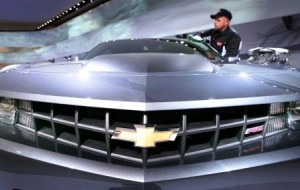As the press days fade from memory and actual buyers are allowed onto the show floor at Cobo Hall for the North American International Auto Show in Detroit, the latest data show that people could care less about the green machines that were universally hyped by automakers earlier this week.
The highest consumer interest — based on web research that is now at the heart of the buying process — shows that vehicles from Chevrolet, Lexus, Nissan and Honda are popular, but none of the most popular models that people are looking at is remotely close to being the most fuel efficient in its maker’s lineup.
The Chevrolet Camaro (19 mpg), a muscle car favorite — please note Speaker of the House Nancy Pelosi — led as being the most researched vehicle on NADAguides.com during the opening weeks of this new decade as the Detroit show got underway. NADA, for reference, is the largest publisher of vehicle pricing and information for new and used cars.
Camaro, at 61,000 sold in 2009, is now running nose-to-nose against Ford’s Mustang, which sold more than 66,000 pony cars for the number one spot in this, well, less than fuel-efficient segment. Chevy would have sold more but they couldn’t make them.
The other most researched cars were the Lexus ES350 (19 mpg), Nissan Altima (18 mpg), Honda Accord (19 mpg) and the Lexus RX 350 (17 mpg).
This supports our hypothesis I humbly submit that although small cars, electric vehicles and hybrids are needed for the marketing of cars and for obtaining taxpayer bailouts from politicians, consumers – the people who make up the real market and pay the taxes — remain more interested in performance, luxury and reliability, than they are in allegedly environmentally friendly vehicles.
“Although electric, hybrid and small cars are being showcased in Detroit this week, the patterns we are seeing from consumers show a desire for affordable and efficient vehicles that offer substantial performance, upscale amenities and impressive technology,” said Mike Caudill, of NADAguides.com.
No argument here.


I am not a tree hugger in any sense of the word but I am a believer in common sense conservation.
In 2008, I decided to take the plunge and buy a new Toyota Prius.
It is undoubtedly a brilliantly conceived vehicle and I like many things about it.
However, now that the car is almost two years old, I have now discovered why I would not buy another of these highly sophisticated and very complicated cars. Namely, when there is a problem, I don’t have confidence that the dealer service departments have the necessary expertise to fix these cars when there is a problem.
My advice to anyone thinking about buying a hybrid car is to BEWARE!!
They are very complicated and the only people who will service them are the dealers that sell them, so you are at the mercy of those dealer service departments. My experience has taught me to never buy another hybrid car.
My next vehicle, which I am patiently searching for as of this very moment, will be a simple Ford or Chevy that can be serviced by almost any shop I choose.
The hybrids are just a solution in search of a problem. While they may have modest merit for short-term reduction of urban pollution, they create problems, too. The exotic materials in the batteries come via manufacturing processes that are pollution sources themselves. Thus, the net improvement isn’t so spectacular. Furthermore, disposal of the batteries is a problem we will face in the future. (Let’s send them to PETA or the ACLU.)
Related: The fallacy of the original premise, the supposed need to reduce CO2. We don’t really have any CO2 problem. Changes in atmospheric CO2 are linked to human activity and global temperature changes are linked to CO2 only if the graphs are compared selectively. (You can prove virtually any bizarre contention using that fraudulent method.) Relax. Generate all the CO2 you like. Make a plant happy.
Thanks for reading.
JM
tjw: Independent shops are increasingly being forced out of repairs on many more vehicles than hybrids. The computerized equipment required, the diagnostic codes, factory updates to programs — all force people back into dealerships. There is a certain amount of choice that results from high volume vehicles, but it’s no guarantee that you won’t end up back at a dealer for service.